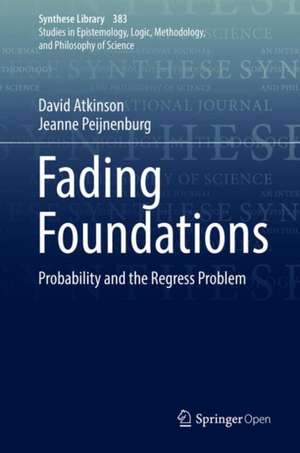Fading Foundations: Probability and the Regress Problem: Synthese Library, cartea 383
Autor David Atkinson, Jeanne Peijnenburgen Limba Engleză Hardback – 7 iul 2017
This book is open access under a CC BY 4.0 license.
This book addresses the age-old problem of infinite regresses in epistemology. How can we ever come to know something if knowing requires having good reasons, and reasons can only be good if they are backed by good reasons in turn? The problem has puzzled philosophers ever since antiquity, giving rise to what is often called Agrippa's Trilemma. The current volume approaches the old problem in a provocative and thoroughly contemporary way. Taking seriously the idea that good reasons are typically probabilistic in character, it develops and defends a new solution that challenges venerable philosophical intuitions and explains why they were mistakenly held. Key to the new solution is the phenomenon of fading foundations, according to which distant reasons are less important than those that are nearby. The phenomenon takes the sting out of Agrippa's Trilemma; moreover, since the theory that describes it is general and abstract,it is readily applicable outside epistemology, notably to debates on infinite regresses in metaphysics. The book is a potential game-changer and a must for any advanced student or researcher in the field.| Toate formatele și edițiile | Preț | Express |
|---|---|---|
| Paperback (1) | 364.53 lei 39-44 zile | |
| Springer International Publishing – 12 mai 2018 | 364.53 lei 39-44 zile | |
| Hardback (1) | 377.94 lei 39-44 zile | |
| Springer International Publishing – 7 iul 2017 | 377.94 lei 39-44 zile |
Din seria Synthese Library
- 15%
 Preț: 638.43 lei
Preț: 638.43 lei - 18%
 Preț: 989.98 lei
Preț: 989.98 lei - 15%
 Preț: 596.69 lei
Preț: 596.69 lei - 18%
 Preț: 903.93 lei
Preț: 903.93 lei - 15%
 Preț: 586.88 lei
Preț: 586.88 lei - 15%
 Preț: 696.50 lei
Preț: 696.50 lei - 18%
 Preț: 892.90 lei
Preț: 892.90 lei - 15%
 Preț: 643.34 lei
Preț: 643.34 lei -
 Preț: 282.33 lei
Preț: 282.33 lei - 5%
 Preț: 372.19 lei
Preț: 372.19 lei -
 Preț: 443.10 lei
Preț: 443.10 lei - 15%
 Preț: 637.59 lei
Preț: 637.59 lei - 18%
 Preț: 958.88 lei
Preț: 958.88 lei - 15%
 Preț: 642.36 lei
Preț: 642.36 lei - 18%
 Preț: 1230.66 lei
Preț: 1230.66 lei - 15%
 Preț: 642.83 lei
Preț: 642.83 lei - 18%
 Preț: 1000.39 lei
Preț: 1000.39 lei -
 Preț: 389.70 lei
Preț: 389.70 lei - 15%
 Preț: 637.28 lei
Preț: 637.28 lei - 18%
 Preț: 952.26 lei
Preț: 952.26 lei - 18%
 Preț: 1231.32 lei
Preț: 1231.32 lei - 15%
 Preț: 645.96 lei
Preț: 645.96 lei -
 Preț: 395.85 lei
Preț: 395.85 lei -
 Preț: 400.47 lei
Preț: 400.47 lei - 18%
 Preț: 1225.48 lei
Preț: 1225.48 lei - 15%
 Preț: 638.89 lei
Preț: 638.89 lei - 18%
 Preț: 1232.09 lei
Preț: 1232.09 lei -
 Preț: 380.45 lei
Preț: 380.45 lei -
 Preț: 394.87 lei
Preț: 394.87 lei - 15%
 Preț: 640.37 lei
Preț: 640.37 lei - 15%
 Preț: 639.08 lei
Preț: 639.08 lei -
 Preț: 381.98 lei
Preț: 381.98 lei - 15%
 Preț: 643.00 lei
Preț: 643.00 lei - 15%
 Preț: 672.29 lei
Preț: 672.29 lei
Preț: 377.94 lei
Nou
Puncte Express: 567
Preț estimativ în valută:
72.32€ • 75.02$ • 60.31£
72.32€ • 75.02$ • 60.31£
Carte tipărită la comandă
Livrare economică 24-29 martie
Preluare comenzi: 021 569.72.76
Specificații
ISBN-13: 9783319582948
ISBN-10: 3319582941
Pagini: 235
Ilustrații: XI, 238 p.
Dimensiuni: 155 x 235 mm
Greutate: 0.53 kg
Ediția:1st ed. 2017
Editura: Springer International Publishing
Colecția Springer
Seria Synthese Library
Locul publicării:Cham, Switzerland
ISBN-10: 3319582941
Pagini: 235
Ilustrații: XI, 238 p.
Dimensiuni: 155 x 235 mm
Greutate: 0.53 kg
Ediția:1st ed. 2017
Editura: Springer International Publishing
Colecția Springer
Seria Synthese Library
Locul publicării:Cham, Switzerland
Cuprins
1. The Regress Problem.- 2. Epistemic Justification.- 3. The Probabilistic Regress.- 4. Fading Foundations and the Emergence of Justification.- 5 Finite Minds.- 6. Conceptual Objections.- 7. Higher-Order Probabilities.- 8. Loops and Networks.
Textul de pe ultima copertă
This book is open access under a CC BY 4.0 license.
This book addresses the age-old problem of infinite regresses in epistemology. How can we ever come to know something if knowing requires having good reasons, and reasons can only be good if they are backed by good reasons in turn? The problem has puzzled philosophers ever since antiquity, giving rise to what is often called Agrippa's Trilemma. The current volume approaches the old problem in a provocative and thoroughly contemporary way. Taking seriously the idea that good reasons are typically probabilistic in character, it develops and defends a new solution that challenges venerable philosophical intuitions and explains why they were mistakenly held. Key to the new solution is the phenomenon of fading foundations, according to which distant reasons are less important than those that are nearby. The phenomenon takes the sting out of Agrippa's Trilemma; moreover, since the theory that describes it is general and abstract, it is readily applicable outside epistemology, notably to debates on infinite regresses in metaphysics. The book is a potential game-changer and a must for any advanced student or researcher in the field.
Caracteristici
This is an Open Access publication and the content is freely downloadable Sets out a potentially transformative, probabilistic approach to infinite regresses Cogent critical analysis of current limitations in infinitist methodology Core thematic focus on epistemology
